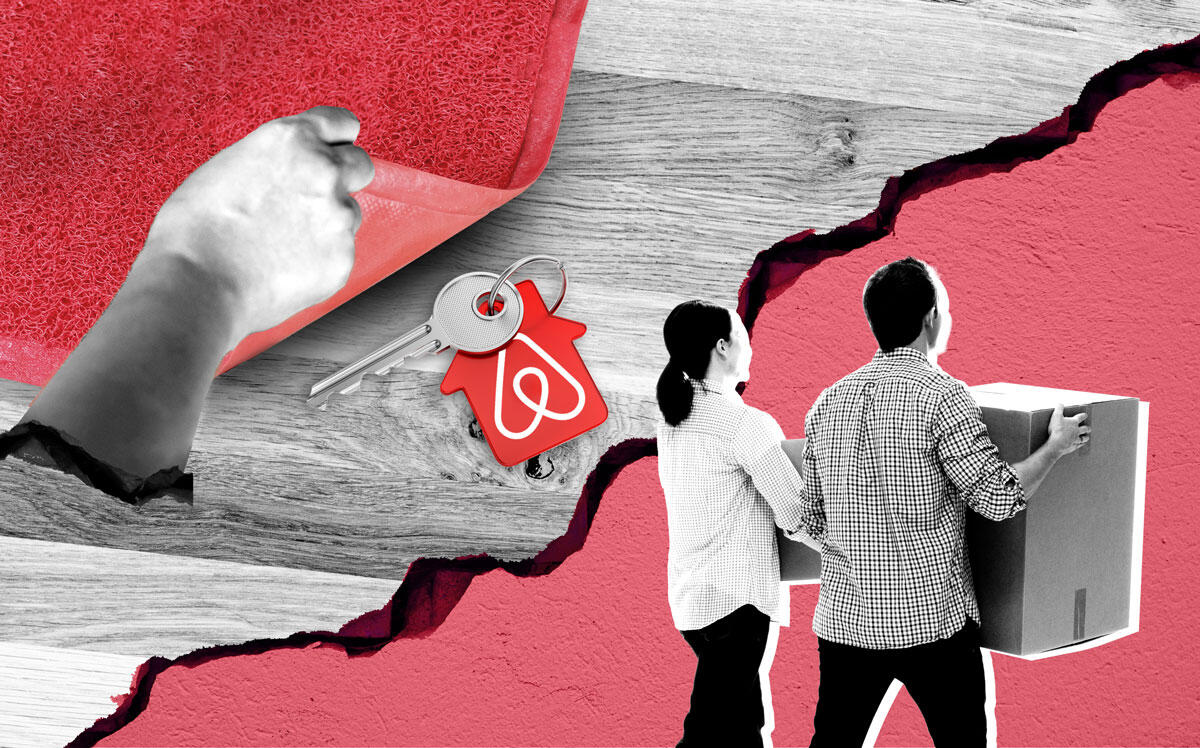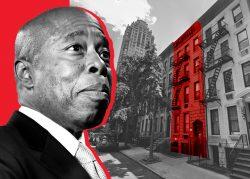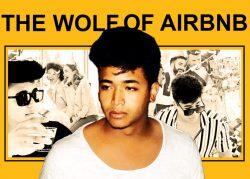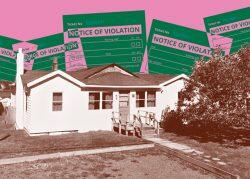
(Illustration by The Real Deal with Getty)
In a three-story brick building in Queens, a couple was forced to move out of their one-bedroom rental in August because of an illegal Airbnb scheme.
But they weren’t the ringleaders. They were the ones who reported it.
Five months earlier the couple had nabbed the ground-floor unit in Flushing for just $1,700 a month. The husband, an undergrad student studying computer science, and his wife, a baker, signed a one-year lease and moved in by April.
Their joy was short-lived. At odd hours of the night, they would regularly wake to the doorbell ringing or furniture being dragged across the floor of the apartment above.
The pair, who requested anonymity to share their story with The Real Deal, told the landlord, who accompanied the husband upstairs to confront the tenant. Instead they found an Airbnb guest. The nighttime cacophony was coming from a steady parade of short-term renters.
The owner indicated this was news to her as well but took no action. And the noise continued.
With the racket becoming unbearable, the husband called 311. That got right back to the landlord, who casually told the couple — not the upstairs tenant — to move out. The upstairs tenant also found out about the complaint and threatened the husband during an encounter in the building.
Welcome to New York City’s short-term rental industry, where victims are powerless, profiteers run rampant and most visitors have no idea their stays are illegal.
The underlying problem: Illegal rentals are so common that the city can’t police them all, and Airbnb profits off them with little risk to itself.
“Any liability is going to fall on the host,” said the husband. “If any.”
A law in name only
State law and city regulations are clear: Home rentals of fewer than 30 days are not permitted unless the permanent resident is present.
But that’s not clear at all to the millions of people who search Airbnb and other online platforms for a place to stay in New York City. The tenants and owners listing those units, however, do know they are breaking the law. They also know their chances of being caught are next to nothing. Safety in numbers.
The city and Airbnb have been at war over the issue for the past decade. Visitors who stay in Airbnbs help the city’s economy, but city officials want them to stay in hotels, not in apartments — especially with the tight housing supply driving up rents.
Read more



The city has enacted a series of measures intended to stamp out the problem, but each one has fallen short because of the incentives to break the law and the practical difficulty of enforcing it.
Now the Adams administration is hoping the latest statute, which aims to stop people from using the platforms without first registering with the city, will do the trick.
The enforcer
All short-term rentals of entire homes are illegal in New York, but some are more illegal than others.
It is one of the most important lessons that Christian Klossner has learned in his seven years as executive director of the Mayor’s Office of Special Enforcement, the unit tasked with stopping illegal rentals.
Airbnb has run ads portraying its users as single-property owners renting out rooms to help pay the bills, even to save their homes from foreclosure. The implication is clear: Why should that be illegal?
But Klossner and his 30 full-time staffers have neither the resources nor the interest to go after those owners. With about 13,000 homes in the city regularly being rented illegally, they target the operators taking the most units off the market.
“Someone who is living in their own home, occasionally renting it out a few times a year, and doing it in a way where they aren’t driving the neighbors crazy is not our priority,” said Klossner. “We have bigger fish to fry.”
In the 2000s, most of the work investigating short-term rentals was driven by complaints from 311 calls, community groups and elected officials. Large, Upper West Side buildings were a focus: Broadway Hotel & Hostel, Royal Park Hotel & Hostel and Marrakech Hotel.
Then, in 2008, Airbnb arrived. Renting out rooms became a do-it-yourself project, with the entire world as a customer base.
City regulators narrowed their efforts to commercial players with scores of listings and operators who generated complaints or put people’s safety at risk.
Besides alleviating the housing shortage, there was another motivation: protecting hotels and members of the politically powerful Hotel Trades Council who staff them. The union supported Bill de Blasio’s campaigns for mayor, governor and president and Eric Adams’ mayoral bid. It is supporting Gov. Kathy Hochul’s run for her first four-year term.
Large-scale illegal rental operations snatch business from the hotel industry. With lower property taxes and no hotel taxes, they can charge less than hotels. Most residential buildings also lack the extensive safety protocols required of hotels — which can have serious consequences.
“It’s an almost totally unregulated industry,” said Vijay Dandapani, president of the Hotel Association of New York City.
The hotel industry has funded private investigators and researchers to try to show that Airbnb is hurting New Yorkers, and the city has welcomed the assistance. Klossner’s team, which has lost more than 40 percent of its head count since peaking at 53 members in 2018, needs all the help it can get: Although it is easy for tourists to book illegal rentals, it is surprisingly hard to police them.
Catch me if you can
For safety reasons, Airbnb doesn’t require users to specify the exact location of their listing so instead they use addresses a block or two away. Operators take that to the next level, using fake names, fake addresses and other tricks that make documenting illegality a painstaking enterprise.
“In the beginning, we had to rely on pictures of the apartment and descriptions of the neighborhood to find out where the listings really were,” Klossner said.
To efficiently find and shut down egregious operators, the city needed Airbnb’s private data. The company has long maintained that it does what it can to ensure its service is used legally, but it fought the city’s demands for extensive records, suing to block a disclosure law it considered too invasive.
In a settlement, the city got most of what it wanted in the law, which passed in 2020. Online, short-term rental platforms had to hand over quarterly data on bookings, including the address of each rental, the URL of the listing, details about the reservation, contact information about the host and bank accounts to which payouts were made.
The first major illegal operation identified using the law was an alleged $2 million scheme orchestrated by real estate broker Arron Latimer. When the city announced its lawsuit against Latimer in July, Airbnb released a statement that it had banned the host from the platform months before. It failed to mention that its action came after the city subpoenaed Airbnb for information on Latimer, or to explain why the operation had continued unchecked for four years.
Airbnb has a “one host, one home” policy, but, like a needlepoint sampler hanging on the wall, it is mostly decorative. The lack of imperative can be traced to Section 230 of the federal Communications Decency Act, which made online platforms legally immune from most of the content shared by their users.
“These online platforms hide behind this [federal] law while they let their users, who they say they care a tremendous amount about, take all the heat — and all the fines,” Klossner said.
Airbnb has for years sought legalization of short-term rentals in New York, which it says would generate substantial tax revenue for the state. But lawmakers have consistently rejected the offer, so the company has little reason to cooperate.
In a statement, Airbnb commended the Adams administration for taking action against illegal hotel operators.
“Airbnb currently shares information with the city, and looks forward to working with the city and state to build an effective and transparent regulatory framework to differentiate between the responsible hosts who should be protected under the law and operators of properties who have no place on our platform,” said Nathan Rotman, the company’s head of public policy in the region.
The city can penalize landlords and recover hosts’ illegally obtained revenue, but Airbnb’s profits — it pockets a minimum 3 percent commission on bookings — can’t be touched. In fact, one demand that the city dropped in its settlement with Airbnb was for rental platforms to disclose what they make from each transaction.
Although the 2020 law dramatically reduced the number of illegal listings and provides the city with quarterly reports showing lots of illegal rentals, the Office of Special Enforcement still has to observe illegal activity to penalize it. Like many city agencies, the unit is operating well below its budgeted head count. Another shortcoming of the law is that many transactions appear legal in the data but are not.
Klossner needed the Holy Grail: to make it impossible for hosts to book illegal rentals online in the first place.
The short-term rental registration law passed last year, which takes effect in January, could do that. It would for the first time require hosts to register their homes before renting them out. The city will vet applicants to make sure their homes are legal to rent for fewer than 30 days and provide a confirmation number, without which the platforms will not process the transaction.
The measure, which echoes others in cities including Boston and Santa Monica, also has teeth. Hosts face fines up to $5,000 and platforms can be dinged $1,500 for every illegal booking.
“I am confident that once this law is fully implemented, the scale of illegal activity on the site is going to be brought down to a manageable level,” said Klossner.
It will come too late for the husband and wife in Queens, who decided to leave, but not before doing considerable detective work to stop the illegal rentals upstairs.
“Ninety-nine-point-nine percent of the time I’m a big advocate of minding your own business,” said the husband. “But when it affects my quality of life at home and I get threatened, I feel like this business becomes my business.”
However, because his neighbor’s listings did not show the address, it was like hunting for a needle in a field of haystacks. The wife persuaded one of the Airbnb guests to give her a screenshot confirming the booking. Knowing what the inside of the room looked like, the husband found the original Airbnb listing and the host, who had over 200 others across the city, according to the host’s Airbnb page.
“It just angers me, knowing that there’s a huge housing crisis right now,” he said.
It was unclear how many of the listings were for illegal rentals. Some were not active, and others allowed bookings beyond 30 days. At the very least, though, the host was violating Airbnb’s one-home, one-host policy.
In response to requests for comment from TRD, the Queens host blocked communication. TRD also contacted the landlord, who speaks only Mandarin, but she claimed to know nothing about the matter.
On Aug. 2, there was an update to the 311 complaint from June 25: “The Department of Buildings attempted to investigate this complaint but could not gain access to the location. Please schedule an appointment for a follow-up inspection by contacting the appropriate unit at the Department of Buildings.”
But the couple had already moved on, literally. After consulting a lawyer and realizing they could not afford to sue, the couple got the landlord to buy out their lease and moved to another apartment in Queens.
Although Airbnb did not grant an interview for this story, the company asked for TRD’s information on the host so it could investigate.
But the husband said Airbnb already has it. He said he complained to the booking giant about 20 times, offering detailed information about the host and the laws he was violating. Airbnb has yet to take any action.
“I fully expected it,” he said. “Airbnb investigated themselves and found nothing.”
